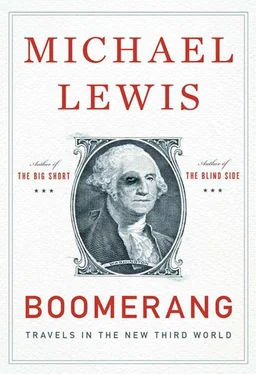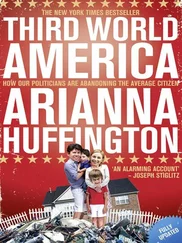“How much money did you lose in subprime?” I ask.
“I don’t want to tell you,” he says.
He laughs and then continues. “For forty years we didn’t lose a penny on anything with a triple-A rating,” he says. “We stopped building the portfolio in subprime in 2006. I had the idea that there was something wrong with your market. I did not have the idea that your market would completely collapse.” He pauses. “It has told something to me. I was in the belief that the best supervised of all banking systems was in New York. To me the Fed and the SEC were second to none. I did not believe that there would be e-mail traffic between investment bankers saying that they were selling . . .” He pauses again, and decides he shouldn’t say “shit.” “Dirt,” he says. “This is by far my biggest professional disappointment. I was in a much too positive way U.S.-biased. I had a set of beliefs about U.S. values.”
The global financial system may exist to bring borrowers and lenders together, but, over the past few decades, it has become something else, too: a tool for maximizing the number of encounters between the strong and the weak, so that the one might exploit the other. Extremely smart traders inside Wall Street investment banks devise deeply unfair, diabolically complicated bets, and then send their sales forces out to scour the world for some idiot who will take the other side of those bets. During the boom years a wildly disproportionate number of those idiots were in Germany. As a reporter for Bloomberg News in Frankfurt named Aaron Kirchfeld put it to me, “You’d talk to a New York investment banker and they’d say, ‘No one is going to buy this crap. Oh. Wait. The Landesbanks will!’” When Morgan Stanley designed extremely complicated credit default swaps so they were all but certain to fail, so that their own proprietary traders could bet against them, the buyer was German. When Goldman Sachs helped the New York hedge fund manager John Paulson design a bond to bet against—a bond that Paulson hoped would fail—the buyer on the other side was a German bank called IKB. IKB, along with another famous fool at the Wall Street poker table called WestLB, was based in Düsseldorf—which is why, when you asked a smart Wall Street subprime mortgage bond trader circa June 2007 who was still buying his crap, he could say, simply, “Stupid Germans in Düsseldorf.”
THE DRIVE FROM Berlin to Düsseldorf takes longer than it should. For long stretches the highway is choked with cars and trucks. A German traffic jam is a peculiar sight: no one honks, no one switches lanes searching for some small, illusory advantage, all trucks remain in the right-hand lane, where they are required to be. The spectacle of sparkling BMWs and Mercedes-Benzes in the left lane and immaculate trucks in a neat row in the right lane is almost a pleasure to watch. Because everyone in the jam obeys the rules, and believes that everyone else will obey them, too, the cars and trucks move as fast as they can, given the circumstances. But the pretty young German woman behind the wheel of our car doesn’t take any pleasure in it. Charlotte huffs and groans at the sight of brake lights stretching into the distance. “It’s what I hate more than anything in the world,” she says apologetically. “I hate being stuck in traffic.”
She pulls from her bag the German translation of Alan Dundes’s book. I’d asked her about the title. There is a common German expression, she explains, that translates directly as “lick my ass.” To this hearty salutation the common German reply is, “You lick mine first.” The German version of Dundes is called You Lick Mine First . “Everyone will understand this title,” she says. “But this book, I don’t know about this.”
The last time I’d been in Germany for more than a few days was when I was seventeen years old. I’d traveled across the country with two friends, a bike, and a German phrase book. In my head was a German love song taught to me by an American woman of German descent. So few people spoke English that it was better to assume they did not and deploy whatever German came to hand—which usually meant the love song. And so I assumed on this trip I would need an interpreter. I didn’t appreciate how much the Germans had been boning up on their English. The entire population seems to have taken a total-immersion Berlitz course. And on Planet Money, even in Germany, English is the official language. It’s the language used for all meetings inside the European Central Bank, for instance, even though the ECB is in Germany, and the only ECB country in which English is even arguably the native tongue is Ireland.
Through a friend of a friend of a friend I’d landed Charlotte, a sweet-natured, keenly intelligent woman in her twenties who was also shockingly steely—how many sweet-natured young women can say “lick my ass” without blushing? She spoke seven languages, including Mandarin and Polish, and was finishing up her master’s in Intercultural Misunderstanding, which just has to be Europe’s next growth industry. By the time I realized I didn’t need her I’d already hired her, and so she had ceased to be my interpreter and become my driver. As my interpreter, she would have been ridiculously overqualified; as my chauffeur she is frankly preposterous. But she’d taken on the job with gusto, going so far as to hunt down an old German translation of Dundes’s little book.
And it troubled her. For a start, she refused to believe there was such a thing as a German national character. “No one in my field believes this anymore,” she says. “How do you generalize about eighty million people? You can say they are all the same, but why would they be this way? My question about Germans’ being anally obsessed is how would this spread? Where would it come from?” Dundes himself actually made a stab at answering the question. He suggested that the unusual swaddling techniques employed by German mothers, which left babies stewing in their own filth for long periods of time, might be responsible for their energetic anality. Charlotte was not buying it. “I’ve never heard of this,” she says.
But just then she spots something and brightens. “Look!” she says. “A German flag.” Sure enough, a flag flies over a small house in a distant village. You can spend days in Germany without seeing a flag. Germans aren’t allowed to cheer for their team the way other people do. That doesn’t mean they don’t want to, just that they must disguise what they are doing. “Patriotism,” she says, “is still taboo. It’s politically incorrect to say, ‘I’m proud to be German.’”
The traffic eases, and we’re once again flying toward Düsseldorf. The highway looks brand-new, and she guns the rented BMW until the speedometer tops 210 kilometers per hour.
“This is a really good road,” I say.
“The Nazis built it,” she says. “That’s what people say about Hitler, when they get tired of saying the usual things. Well, at least he built good roads.”
BACK IN FEBRUARY 2004 a financial writer in London named Nicholas Dunbar broke the story about some Germans in Düsseldorf, working inside a bank called IKB, who were up to something new. “The name IKB just kept coming up in London with bond salesmen,” says Dunbar. “It was like everybody’s secret cash cow.” Inside the big Wall Street firms there were people whose job it was, when the German customers from Düsseldorf came to London, to get a wad of cash and make sure the Germans got whatever they wanted.
Dunbar’s piece appeared in Risk magazine and described how this obscure German bank was rapidly turning into Wall Street’s biggest customer. IKB had been created back in 1924 to securitize German war reparation payments to the Allies, morphed into a successful lender to midsized German companies, and was now morphing into something else. The bank was partially owned by a German state bank, but was not itself guaranteed by the German government. It was a private German financial enterprise, seemingly on the rise. And it had hired a man named Dirk Röthig, a German with some experience in the United States (he’d worked for State Street Bank), to do something new and interesting.
Читать дальше












